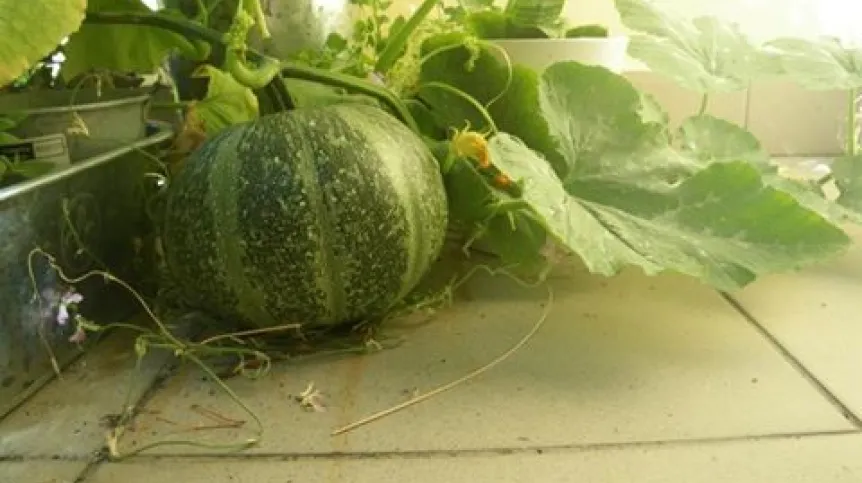
The creators of gardens invite to experiment this spring. Instead of the traditional geraniums on the balcony, they propose to plant fruit shrubs, vegetables and vines that bear original fruits - such as gourd.
Every space is good for starting a garden - argues Dr. Mariusz Antolak from the Department of Landscape Architecture at the University of Warmia and Mazury in Olsztyn.
"It\'s hard to find a space unsuitable for starting a garden. After all, you can start one in a circumpolar, subtropical and equatorial climate, in the centre of the city, in a small town, in rural areas, but also on a balcony. In my opinion, it\'s not the end result that matters, but the creation process itself, which furthers development, relaxes and has therapeutic effects" - said Dr. Mariusz Antolak.
According to the expert, a balcony is a great place to create a garden. Numerous technological solutions may help, including: modern planters, automatic watering systems, drainage, structures on which the plants can climb. Miniature green roofs and vertical gardens on the walls can be created on balconies.
In Poland, people who arrange gardens usually want it to be possibly least laborious. They explain that they do not have time for basic care activities. Hence the common view of the gardens with huge lawns surrounded by coniferous plants. In turn, gardens on balconies are arranged ply planting annual plants that require multiple steps: purchase, planting, watering, nurturing.
The expert suggests that perennial plants can be successfully planted on balconies - perennials, shrubs and vines. Their offer is extensive. Various, coloured species of plants growing in the shade, partial shade and full sun can be bought at nurseries, stalls and garden centres. Ideal for a sunny balcony are such perennials as Rudbeckia, cloves or yarrows. You can also plant catnip - adored by cats, flowering throughout the season and requiring little care. Ornamental grasses will be great companions - reed grass, fescue or miscanthus that should be planted in larger pots, providing them with better growth conditions.
The balcony is ideal for planting annual and perennial herbaceous plants such as basil, marjoram, lovage, oregano. Most of them need the sun, but reliable, edible, pro-health and beautiful mint will grow well in the shade. In addition to usability, it is an attractive ornamental plant, eagerly visited by insects during flowering.
Succulents, plants that like dry and sunny places and practically do not require watering are perfectly suited for balconies. They are recommended especially for frequent travellers. The most popular of them are liveforevers and stonecrops. Annuals tulips are also a good solution, but you have to remember to plant them in the fall.
Garden creators encourage not to get attached to the traditional balcony plants and start experimenting.
"I like unusual plants. On my balcony I planted gourd, which has white, night blooming flowers, and its fruits can grow to 1.5 meters in length. After drying, they can be used to make vessels, lanterns and unusual pots. Balcony conditions are also good for ornamental and edible pumpkins, the fruits of which have many colours and shapes" - said Dr. Mariusz Antolak.
He added that his balcony favourites are edible plants: peppers, tomatoes and potatoes, which can be planted in a large pot or burlap sack. The fruit and tubers are suitable for consumption, of course. Also noteworthy are their beautiful flowers, so they can be ornamental plants.
Another great option are shrubby plants, for example Chinese wolfberry, which bears recently very fashionable and pro-health goji fruit. This plant must have a larger pot, because it can grow to two meters in height. Strawberries can also be planted on balconies, and in the next seasons Dr. Antolak will test currants and raspberries.
Experts also encourage the search for horticultural curiosities, such as different coloured varieties of carrots - orange, pink, purple and white. Also beets, whose roots take different shapes, and the leaves are very ornamental.
The garden creator warns of invasive plants that threaten native plants. This includes echinocystis, whose fruits resemble thorny cucumbers. Few people know that its distribution and planting is punishable by a fine or jail.
PAP - Science and Scholarship in Poland
ali/ mrt/ kap/
tr. RL
Fundacja PAP zezwala na bezpłatny przedruk artykułów z Serwisu Nauka w Polsce pod warunkiem mailowego poinformowania nas raz w miesiącu o fakcie korzystania z serwisu oraz podania źródła artykułu. W portalach i serwisach internetowych prosimy o zamieszczenie podlinkowanego adresu: Źródło: naukawpolsce.pl, a w czasopismach adnotacji: Źródło: Serwis Nauka w Polsce - naukawpolsce.pl. Powyższe zezwolenie nie dotyczy: informacji z kategorii "Świat" oraz wszelkich fotografii i materiałów wideo.













